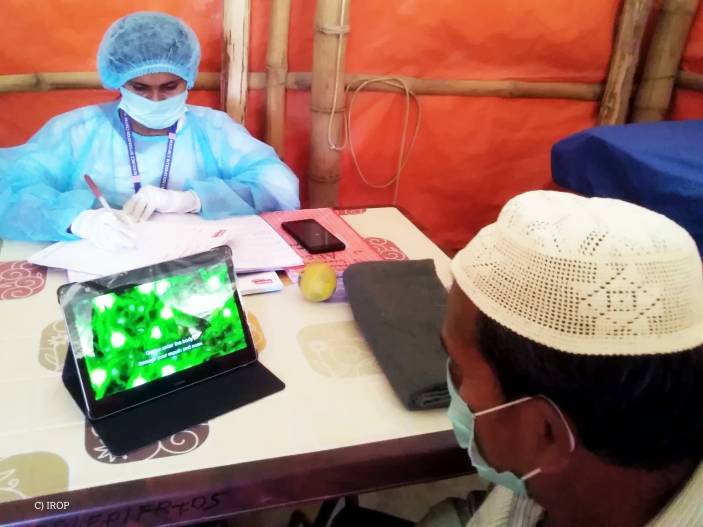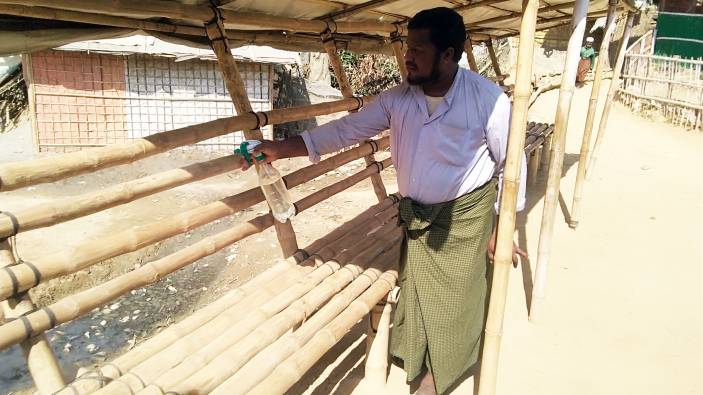7 April 2020
As of 7 April, there are 164 positive cases of coronavirus COVID-19 in the whole of Bangladesh (population of 170 million) and there have been 17 deaths.

Two cases of COVID-19 have been confirmed in Cox’s Bazar, where roughly 855,000 refugees are living in 34 congested camps. The severe overcrowding, poverty and chronic lack of health care facilities are causing huge fears that the virus would quickly spread and spiral out of control in the camps, leading to a colossal loss of lives.
COVID-19 screening is now taking place in a laboratory in Cox’s Bazar. If the number of people infected with COVID-19 exceeds 10, the situation will move from ‘emergency response’ – as part of the national government and WHO planning scenario – to ‘emergency situation that needs extraordinary response’. This will result in a full lockdown, allowing only for life-saving health and nutrition interventions, which will have huge implications for the humanitarian programme in the camps.
Treatment facilities remain limited in the camps and it is believed that Rohingya people will not be able to access treatment centres outside of the camps.
Prevention is absolutely vital, but immense challenge

Jahangir Alam, acting country director of HelpAge International in Bangladesh, said:
“Given the horrendous consequences of a COVID-19 outbreak in Cox’s Bazar, prevention is absolutely vital, but the challenges are immense. Physical distancing is almost impossible in the Rohingya camp. Even if people self-quarantine there are between 5-8 family members living in one room. People have to move around the camp, as most of them don’t have running water, toilets and bathing facilities in their own homes. Families only receive one bar of soap a month and many have sold theirs to meet other essential needs.
“We are specifically worried about older people. Many of them are suffering from hypertension, diabetes and cardiovascular and chronic respiratory diseases, which are exacerbated by the poor conditions in the camp, so they are dangerously vulnerable.”
HelpAge is distributing hand sanitation and detergent powder, gradually reaching 21,000 older people. Teams have also established handwashing points at the entrance of all service facilities.
Lack of information, mistrust and rumours
There is a huge lack of awareness of the facts about COVID-19 in the camps; telecommunications is very challenging; and rumours and mistrust are rife.
Jahangir explained: “Many people believe that they won’t contract COVID-19 as there are such low numbers at the moment in Cox’s Bazar; others believe that the numbers are much higher than has been stated and are terrified of contracting the virus. Many believe that it’s coming from outsiders, so they are hesitant to welcome NGO workers even if they are providing emergency services.”
HelpAge staff are educating people in the camps about COVID-19 using audio messages in the Rohingya language developed by BBC Media Action amplified by loud speakers.
Poor treatment facilities
“There are 300 isolation beds in Ukhiya camp but this is for a population of almost one million,” explained Jahangir. “I cannot bear to think what will happen if there is an outbreak here. Things will quickly spiral out of control and there will be a colossal loss of life.”
There are 120 isolation beds available in the nearby sub-districts of Ramu and Chakaria but it is very unlikely that Rohingya people will be able to access this, as the local population is 400,000.
When asked if there are any treatment facilities in the camps, Jahangir sighed in exasperation: He explained: “Unfortunately, at the moment, if someone becomes acutely ill with COVID-19, it could very likely be a death sentence. There are only three ventilators for all of the camps and there are no treatment centres outside of the camps at this moment. Even if they are available, it is very difficult for Rohingya people to be able to access them.”
Work is being carried out to establish new isolation and treatment facilities but there is a glaring lack of Personal Protective Equipment (PPE) for the health workers and community outreach staff.
Jahangir said: “The government and NGOs are all trying their best like everyone across the world but it’s very difficult. It’s mind-boggling when you hear on the news that hospitals in cities like New York are struggling to cope. So how can we be expected to cope here in these conditions? Doctors and nurses are petrified they will contract the virus without the vital personal protective equipment. Many older people are suffering from a seasonal flu at the moment and they are not getting the treatment they need as health workers suspect it may be COVID-19 and are too scared to treat them.”
HelpAge is procuring medical gowns, surgical masks, gloves, goggles, hand sanitisers and head and shoe covers. We are also preparing teams of volunteers to be able to provide community health care and water and sanitation on a larger scale in the coming weeks and months.
HelpAge’s work on COVID-19 in Cox’s Bazar is funded by UKAID
